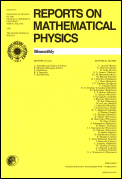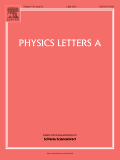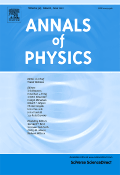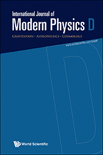
FOUNDATIONS OF PHYSICS
metrics 2024
Fostering Discourse on the Roots of Physical Science
Introduction
FOUNDATIONS OF PHYSICS is a prestigious journal published by SPRINGER, dedicated to the interdisciplinary exploration of the philosophical and historical dimensions of physics. With a rich publication history spanning from 1970 to 2024, the journal holds a prominent position in the academic community, evidenced by its Q1 ranking in both History and Philosophy of Science and Philosophy, as well as a respectable Q2 in Physics and Astronomy for miscellaneous topics. The journal's ISSN is 0015-9018 and its E-ISSN is 1572-9516, facilitating access to a wide array of scholarly articles. Although it does not offer an open access option, the journal remains an invaluable resource for researchers, professionals, and students eager to delve into the complexities that intertwine physics with philosophical inquiry and historical context. As a critical platform for groundbreaking research, FOUNDATIONS OF PHYSICS fosters vibrant discourse and encourages innovative thought within these essential fields.
Metrics 2024
 0.45
0.45 1.20
1.20 1.30
1.30 62
62Metrics History
Rank 2024
Scopus
IF (Web Of Science)
JCI (Web Of Science)
Quartile History
Similar Journals

Frontiers of Physics
Igniting Curiosity in the World of PhysicsFrontiers of Physics, published by Higher Education Press, is a premier open-access journal dedicated to fostering innovative research and excellence within the field of physics. With an ISSN of 2095-0462 and an E-ISSN of 2095-0470, this rapidly growing journal has established itself as a valuable platform for disseminating cutting-edge findings, covering a diverse range of topics from theoretical frameworks to experimental advancements. Notably, Frontiers of Physics has achieved an impressive Q1 ranking in the 2023 Scopus Quartiles for Physics and Astronomy, securing a competitive 5th out of 81 positions in its category, reflecting a high impact factor that underscores its importance to the scientific community. Since its inception in 2011 and continuing through 2024, the journal aims to bridge the gap between academia and industry, encouraging collaboration among researchers, professionals, and students alike. Its commitment to open access ensures that high-quality research is readily accessible, thereby promoting knowledge sharing and advancement in the global physics community. Explore the potential of your research in Frontiers of Physics, where the future of physics flourishes.

PHYSICAL REVIEW LETTERS
Elevating Physics Knowledge with Every LetterPhysical Review Letters, published by the American Physical Society, is a premier journal in the field of Physics and Astronomy renowned for its rapid dissemination of high-impact research findings. With a distinguished history dating back to 1958 and an impressive ranking of #13 out of 243 in the general physics category, it stands proudly within the Q1 quartile, placing it in the top 6% of journals in its field. The journal focuses on brief reports of significant fundamental research across all areas of physics, making it an essential resource for researchers, professionals, and students seeking to stay at the forefront of developments in their field. Although Physical Review Letters does not offer open access options, its rigorous peer-review process ensures a high standard of quality and relevance in its published articles. With an unwavering commitment to advancing the understanding of physical science, this journal is indispensable for those looking to make a genuine impact in their research endeavors.

REPORTS ON MATHEMATICAL PHYSICS
Exploring the Nexus of Mathematics and PhysicsREPORTS ON MATHEMATICAL PHYSICS is a distinguished journal published by PERGAMON-ELSEVIER SCIENCE LTD, focusing on the intricate interplay between mathematics and physics. Established in the United Kingdom, this journal has been contributing to the academic community since its inception, publishing significant research findings that explore the theoretical underpinnings of physical phenomena. With an ISSN of 0034-4877 and an E-ISSN of 1879-0674, the journal maintains a consistent publishing history, converging research from 1970 to 2024. It is currently ranked Q3 in both Mathematical Physics and Statistical and Nonlinear Physics categories, reflecting its commitment to maintaining a high standard of scholarly work. Although it lacks Open Access options, its targeted audience of researchers, professionals, and students will find invaluable insights into advanced mathematical methods, statistical applications, and innovative approaches in physics. With its esteemed reputation and critical role in the field, REPORTS ON MATHEMATICAL PHYSICS continues to be an essential resource for those seeking to deepen their understanding of mathematical applications in physical systems.

LETTERS IN MATHEMATICAL PHYSICS
Illuminating the complexities of physical phenomena through mathematics.LETTERS IN MATHEMATICAL PHYSICS, published by Springer, stands as a pivotal platform in the realm of mathematical and statistical physics. With a commitment to disseminating innovative research findings since its inception in 1975, this journal serves both established and emerging scholars by fostering a multidisciplinary dialogue that is vital for the advancement of theoretical concepts and practical applications. The journal boasts an impressive Q1 ranking in both Mathematical Physics and Statistical and Nonlinear Physics categories as of 2023, reflecting its significant impact in these fields, supported by a strong Scopus ranking of 36th and 37th in respective categories. Although it operates on a traditional access model, the journal’s convergence until 2024 ensures a rich repository of literature that aids researchers, professionals, and students in navigating the complexities of mathematical physics. With its strategic location in the Netherlands, LETTERS IN MATHEMATICAL PHYSICS is poised to continue its tradition of excellence, encouraging contributions that deepen the understanding of mathematical frameworks underlying physical phenomena.

GENERAL RELATIVITY AND GRAVITATION
Connecting Ideas: Where Gravity Meets InnovationGENERAL RELATIVITY AND GRAVITATION is a prestigious journal published by Springer/Plenum Publishers, dedicated to furthering the field of theoretical and experimental relativity and gravitation. With an ISSN of 0001-7701 and E-ISSN of 1572-9532, this journal has established itself as a crucial platform for high-quality research since its inception in 1970, continuing to publish influential findings through 2024. Notably, it is ranked in the top Q1 category within Physics and Astronomy (miscellaneous) for 2023, securing a commendable position at Rank #22/81 on Scopus, which reflects its strong annual performance and impact among peers. While it does not currently offer Open Access options, the journal remains a vital resource for researchers, professionals, and students seeking to explore the complexities of gravitational theory and its applications in modern physics.

JOURNAL OF STATISTICAL PHYSICS
Pioneering research in the realm of quantum and statistical mechanics.The Journal of Statistical Physics, published by Springer, is a premier academic journal that has made significant contributions to the fields of Mathematical Physics and Statistical and Nonlinear Physics since its inception in 1969. With a strong reputation reflected in its 2023 rankings—placing it in Q2 of both categories and achieving an impressive Scopus rank of #22 in Mathematical Physics and #25 in Statistical and Nonlinear Physics—this journal serves as a vital platform for researchers, professionals, and students. The impact factor of the journal underscores its importance in disseminating cutting-edge research and theoretical developments. Authors are invited to submit original research articles that explore the intricate complexities of statistical mechanics, quantum physics, and related disciplines, fostering deep insights and academic discourse. Although the journal does not currently offer open access, its robust editorial standards and commitment to advancing knowledge make it an essential resource for those engaged in these dynamic fields.

PHYSICS LETTERS A
Catalyzing Academic Exchange in PhysicsPhysics Letters A is a renowned scientific journal published by Elsevier, dedicated to the field of physics and astronomy. Established in 1963, it has continuously evolved, offering a platform for the swift dissemination of significant research findings in various branches of physics. As of 2023, it holds a commendable Q2 ranking in the category of Physics and Astronomy (miscellaneous) and ranks 69th out of 243 journals in the same domain according to Scopus, positioning itself in the 71st percentile of academic impact. With its comprehensive scope, Physics Letters A provides a vital resource for researchers, professionals, and students, facilitating academic discourse and advancing knowledge across the field. Although it does not currently offer Open Access options, its rigorous peer-review process ensures high-quality content. It is centrally located in Amsterdam, Netherlands, and continues to be an essential outlet for innovative contributions to the physics community through the year 2024 and beyond.

Annals of Physics
Advancing the frontiers of Physics and Astronomy.Annals of Physics is a premier journal published by Academic Press Inc Elsevier Science, specializing in the expansive field of Physics and Astronomy. Since its inception in 1957, this journal has played a pivotal role in disseminating high-quality research and advancements across various sub-disciplines of physics. With a notable impact factor making it rank in the Q1 category for 2023, it stands among the top tier of scholarly publications, specifically sitting at Rank #63 out of 243 in the field, placing it in the 74th percentile according to Scopus metrics. Researchers are encouraged to submit their findings to reach a broad audience without the constraints of Open Access fees, promoting extensive visibility within the academic community. As we look ahead to 2024, Annals of Physics continues to be an essential resource for professionals, students, and academics striving to advance the frontiers of knowledge in physics and astronomy.

ANNALES HENRI POINCARE
Fostering Innovation Through Open Access ScholarshipANNALES HENRI POINCARE is a prestigious journal published by Springer International Publishing AG, dedicated to advancing research in the fields of Mathematical Physics, Nuclear and High Energy Physics, and Statistical and Nonlinear Physics. With an impressive Q1 ranking in its respective categories as of 2023, this journal is recognized as a vital resource for academic researchers, professionals, and students engaged in frontier studies of theoretical and applied physics. The journal's commitment to high-quality peer-reviewed articles promotes significant contributions to the understanding of complex physical phenomena, making it essential reading for anyone seeking to stay abreast of developments in these dynamic fields. Additionally, ANNALES HENRI POINCARE offers open access options to enhance the visibility and accessibility of groundbreaking research, underscoring its role in fostering collaborative scientific inquiry and innovation. Since its inception in 2000, it has continually provided a platform for scholars worldwide to disseminate their findings and engage with the broader scientific community, thus establishing itself as a cornerstone of academic literature.

INTERNATIONAL JOURNAL OF MODERN PHYSICS D
Unveiling the Mysteries of the UniverseWelcome to the INTERNATIONAL JOURNAL OF MODERN PHYSICS D, a premier publication dedicated to the advancement of knowledge in the fields of Astronomy and Astrophysics, Mathematical Physics, and Space and Planetary Science. Published by WORLD SCIENTIFIC PUBL CO PTE LTD in Singapore, the journal boasts an impressive impact, being ranked Q2 in Astronomy and Astrophysics and Mathematical Physics, and Q3 in Space and Planetary Science. With a converged publishing timeline from 1996 to 2024, this journal provides a vital platform for researchers and professionals to disseminate their findings, engage with cutting-edge research, and explore emerging ideas in modern physics. Although it operates under a traditional access model, the rigorous peer-reviewed process ensures that only the highest quality research contributes to the collective understanding of our universe. Join us in advancing the frontiers of physics and astronomy!